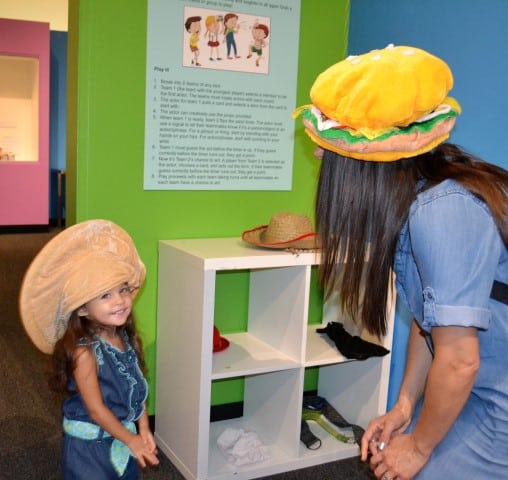A classic game featured in Artful Play! Games & Toys was a version of Charades made for little ones! We called it Act & Giggle.
Charades is a good way to encourage vocabulary development in young children. With older children charades can be a fun and engaging way to learn the meaning of new words and continue building vocabulary.
Playing charades also promotes problem solving and creative movement. Children have the opportunity to use their bodies to illustrate their understanding of familiar and new words.
And, it is great for social interaction and quality family engagement!
At home, you can imagine your living room or backyard patio as your stage. Read below to get started!
Did you know?
People have been playing various forms of charades for centuries. This party game favorite originated in 18th century France as a dramatic literary parlor game. A player would act out each syllable of a phrase without using any words. The game has changed a bit over the years, but it still remains a fun acting game for groups.
This game is sure to bring out creativity and laughter! Gather your family to play.
Step 1: Idea cards
Create cards with charades ideas. Here is a list to start with:
- Brushing teeth
- Building a sandcastle
- Dancing
- Driving a car
- Opening a gift
- Playing baseball
- Shoveling snow
- Swimming
- Skateboarding
- Tying a shoe
- Walking a dog
- Yoga
- Bumblebee
- Bird
- Cat
- Cow
- Dog
- Fish
- Giraffe
- Horse
- Monkey
- Rabbit
- Spider
- Snake
Step 2: Play it!
1. Break into two teams of any size.
2. Team 1 (the team with the youngest player) selects a member to be the first actor. The teams must rotate actors with each round.
3. The actor for team 1 pulls a card and selects a term from the card to start with.
4. When team 1 is ready, team 2 sets a time for 2 minutes (use more time for very young children) The actor must use a signal to let their teammates know if it’s a person/object or an action/phrase. For a person or thing, start by standing with your hands on your hips. For action/phrase, start with pointing to your wrist.
6. Team 1 must guess the act before the time is up. If they guess correctly before the timer runs out, they get a point.
7. Now it’s Team 2’s chance to act. A player from Team 2 is selected as the actor, chooses a card, and acts out the term. If their teammates guess correctly before the time runs out, they get a point.
8. Play proceeds with each team taking turns until all teammates on each team have a chance to act.
You can set a timer to end your game or base the end time on a total number of points. Remember, your focus should be having fun!

